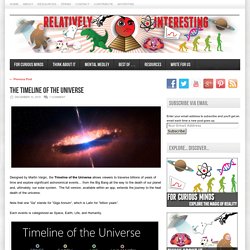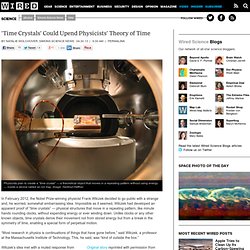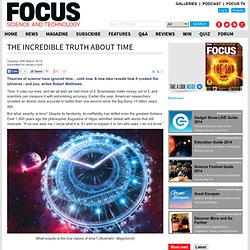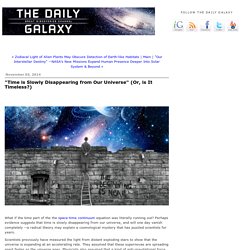

These 15 Illustrations Explain How Differently People Understand ‘Being On Time’ In Different Countries. Punctuality is something that many people struggle to get to grips with, in a busy world full of distractions the temptation to leave things to the last minute can sometimes get the best of you.

However, as the great Albert Einstein said, time is relative. Turning up a few minutes late to a meeting might be considered as a hideous social faux pas in one country, but a perfectly normal and acceptable behavior in another. But how do you know what you are dealing with? Handily, Mr. We Already Know How To Build a Time Machine. We Still Don't Understand Why Time Only Flows Forward. Where Did Time Come From, and Why Does It Seem to Flow? Paul Davies has a lot on his mind—or perhaps more accurate to say in his mind.

A physicist at Arizona State University, he does research on a wide range of topics, from the abstract fields of theoretical physics and cosmology to the more concrete realm of astrobiology, the study of life in places beyond Earth. Nautilus sat down for a chat with Davies, and the discussion naturally drifted to the subject of time, a long-standing research interest of his. Here is a partial transcript of the interview, edited lightly for length and clarity. There might be some pre-geometry, that would give rise to geometry just like atoms give rise to the continuum of elastic bodies. Is the flow of time real or an illusion? Relatively Interesting The Timeline of the Universe - Relatively Interesting. Designed by Martin Vargic, the Timeline of the Universe allows viewers to traverse billions of years of time and explore significant astronomical events… from the Big Bang all the way to the death of our planet and, ultimately, our solar system.

The full version, available within an app, extends the journey to the heat death of the universe. Note that one “Ga” stands for “Giga Annum”, which is Latin for “billion years”. File:Time Travel Method-2.svg. Primer (film) Primer is a 2004 American science fiction drama film about the accidental discovery of a means of time travel.

The film was written, directed, and produced by Shane Carruth. Primer is of note for its extremely low budget (completed for $7,000), experimental plot structure, philosophical implications, and complex technical dialogue, which Carruth, a college graduate with a degree in mathematics and a former engineer, chose not to simplify for the sake of the audience.[2] The film collected the Grand Jury Prize at the 2004 Sundance Film Festival, before securing a limited release in the United States, and has since gained a cult following.[3] 'Time Crystals' Could Upend Physicists' Theory of Time. Physicists plan to create a “time crystal” — a theoretical object that moves in a repeating pattern without using energy — inside a device called an ion trap.

Image: Hartmut Häffner In February 2012, the Nobel Prize-winning physicist Frank Wilczek decided to go public with a strange and, he worried, somewhat embarrassing idea. Impossible as it seemed, Wilczek had developed an apparent proof of “time crystals” — physical structures that move in a repeating pattern, like minute hands rounding clocks, without expending energy or ever winding down. Unlike clocks or any other known objects, time crystals derive their movement not from stored energy but from a break in the symmetry of time, enabling a special form of perpetual motion. “Most research in physics is continuations of things that have gone before,” said Wilczek, a professor at the Massachusetts Institute of Technology. The Little Metronome That Wouldn't : Krulwich Wonders... If this wasn't a science page, if this happened 3,000 years ago in, say, a Middle Eastern desert, I would call it a Miracle.

But it's not. It's just a plain, ordinary moment of "wow! " First, the beginner's version. A man takes a bunch of metronomes, sets them ticking in different ways, then — and this is the crucial part — he lifts them collectively off the table, so their different motions now start to offset each other. And this happens: HERE IS TODAY. The incredible truth about time. Theories of science have ignored time... until now.

A new idea reveals how it created the Universe - and you, writes Robert Matthews. Time: it rules our lives, and we all wish we had more of it. Businesses make money out of it, and scientists can measure it with astonishing accuracy. How To Solve A Rubik's Cube. How Music Hijacks Our Perception of Time - Issue 9: Time. One evening, some 40 years ago, I got lost in time.

I was at a performance of Schubert’s String Quintet in C major. During the second movement I had the unnerving feeling that time was literally grinding to a halt. The sensation was powerful, visceral, overwhelming. It was a life-changing moment, or, as it felt at the time, a life-changing eon. Putting Time In Perspective.
Humans are good at a lot of things, but putting time in perspective is not one of them.

It’s not our fault—the spans of time in human history, and even more so in natural history, are so vast compared to the span of our life and recent history that it’s almost impossible to get a handle on it. If the Earth formed at midnight and the present moment is the next midnight, 24 hours later, modern humans have been around since 11:59:59pm—1 second.
And if human history itself spans 24 hours from one midnight to the next, 14 minutes represents the time since Christ. To try to grasp some perspective, I mapped out the history of time as a series of growing timelines—each timeline contains all the previous timelines (colors will help you see which timelines are which). All timeline lengths are exactly accurate to the amount of time they’re expressing. "Time is Slowly Disappearing from Our Universe" (Or, is It Timeless?) Scientists previously have measured the light from distant exploding stars to show that the universe is expanding at an accelerating rate.

They assumed that these supernovae are spreading apart faster as the universe ages. Physicists also assumed that a kind of anti-gravitational force must be driving the galaxies apart, and started to call this unidentified force "dark energy". However, to this day no one actually knows what dark energy is, or where it comes from. 2 Futures Can Explain Time's Mysterious Past. The Unreality of Time. It doubtless seems highly paradoxical to assert that Time is unreal, and that all statements which involve its reality are erroneous. Such an assertion involves a far greater departure from the natural position of mankind than is involved in the assertion of the unreality of Space or of the unreality of Matter. So decisive a breach with that natural position is not to be lightly accepted. And yet in all ages the belief in the unreality of time has proved singularly attractive.
In the philosophy and religion of the East we find that this doctrine is of cardinal importance. And in the West, where philosophy and religion are less closely connected, we find that the same doctrine continually recurs, both among philosophers and among theologians. Putting Time In Perspective - UPDATED. How Time Tricks Our Minds - Pacific Standard. “Time passes slowly up here in the mountains / We sit beside bridges and walk beside fountains / Catch the wild fishes that float through the stream / Time passes slowly when you’re lost in a dream” —Bob Dylan, “Time Passes Slowly” No, Bob. It doesn't. Time doesn't pass slowly or quickly, unless you happen to be near a black hole. Imaginary time. The relationship of real and imaginary time can be visualised as perpendicular axes of direction. Imaginary time is a concept derived from quantum mechanics and is essential in connecting quantum mechanics with statistical mechanics.
Imaginary time can be difficult to visualize. If we imagine "regular time" as a horizontal line running between "past" in one direction and "future" in the other, then imaginary time would run perpendicular to this line as the imaginary numbers run perpendicular to the real numbers in the complex plane. Imaginary time is not imaginary in the sense that it is unreal or made-up — it simply runs in a direction different from the type of time we experience. In Search of . . . Time Travelers. January 3, 2014— It started over a poker game.
Astrophysicist Robert Nemiroff and his students were playing cards (for chips) last summer, chatting about Facebook. They wondered: If there were time travelers among us, would they be on social media? How would you find them? [1312.7128] Searching the Internet for evidence of time travelers. Searching for Evidence of Time Travel. Communication from the Future. Communication from the Future Discovered and Proven to be REAL!
Did you know that there was a study conducted to see if someone from the future was here present in our time? Yes, it’s true! Astrophysicists – Robert Nemiroff and Teresa Wilson at Michigan Tech University did just that as reported in 2014. They figured that if someone from the future traveled back to our time, there may be trace evidence. Someone may have done internet searches of future events. Backwards Time Travel Would Create Spooky, Self-Annihilating Twins.